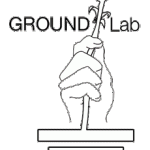GROUND LAB is a research and development company focused on designing and fabricating prototypes and solutions for a wide range of clients, ranging from large organizations like UNICEF to smaller NGOs, conservationists and artists. To prototype and build solutions for these varied challenges requires a high degree of flexible problem solving techniques, skills and solutions, which has led us toward using an open source business model and tools.
The current context of technological development as it applies to what we do
In the last decade technological innovation has shifted away from standalone end products to devices that function as customization platforms. This constitutes the first major influence on our current practice. This shift has led to technologies that are paired with individuals or single objects instead of a location or group, affecting not only the use of these new technologies but also their very creation.
An example of this shift can be cited in the history of communication technologies, e.g. the telephone:
I.1820 - WWII - Towns and large organizations had a single telegraph station, which would link to and service an entire community.
II.WWII - 1990 - Homes and organizations had a direct line whose end point would service a family or a small group of people.
III.Circa 1993 - Present - Phones connect directly to a single end point and are linked to an individual or other object.
A personal connection was developed with these new technologies, which has driven their development and customization. The difference in how we customize technology and objects today, compared to even ten years ago, is the ability to instantly transfer that customization to a million other devices with little or no energy expenditure or learning curve. Because of this instant transfer, user based development is the fastest growing approach to consumer electronics production and is used by the most successful tech companies (Apple became market leader in May-June 2010).
This user-based development structure provides the following benefits:
- Companies are much more flexible to the changes of the end users’ problems through a more comprehensive pool of user testing.
- There is a greater number of people working on these issues who don’t have to be supported directly or financially.
- It allows for a better social linking/advertising, where the people who build the product will most likely be in contact with the people who need it.
- It provides faster development times, since problems get highlighted and corrected by actual use and by the community of users.
The biggest challenge to this development process is the organization of data and consistency between all users’ contributions. Companies have solved this problem by creating development tools and information management communities, which allow users outside these companies to develop applications and software packages for their products, while keeping everyone in the fold, so to speak (e.g. Xcode for Apple).
Because of the need for large-scale organization, this development process has historically been implemented by large entities first (governments, corporations, universities, etc.). Although now, a wide range of content management tools and platforms, from Drupal and WordPress to PayPal and Flickr, are being developed to help the organization of any electronic data. This process is opening up the methods of banking, social organization, and data management to individuals and small companies—like ours—allowing us to have the organizational capabilities of Apple or Sears.
With this advance in organizational tools and the open documentation of knowledge, a full catalog of resources is being created, giving an alternative to the structures of universities and corporate organizations. Small companies and individuals can now start to take on this broad range of services and skills because of the progression away from insular information systems by utilizing a more public based system, like the World Wide Web and open source repositories. These technologies and tools for data transfer and organization are the new institutional middle management of production and the next step will entail the self-organization of small businesses around these services.
Edited by Benedetta Piantella, co-founder of Ground Lab LLC






Comments are closed.